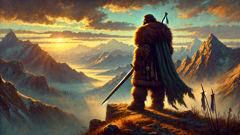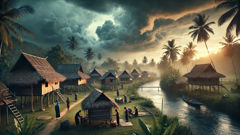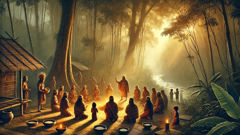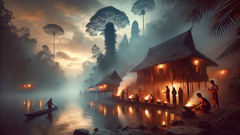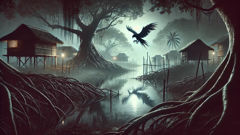Introduction
In the boundless stretches of medieval Russia, where pine forests sighed beneath a cold wind and mountains hulked like sleeping beasts along the horizon, legends grew like wildflowers in spring—unfettered, tangled, and deeply rooted in the earth. None loomed larger in these ancient tales than Svyatogor, the giant bogatyr whose very presence pressed down upon the world. His story did not begin in a cradle or a humble village but somewhere between the sky and the mountains, where the line between man and myth blurred like fog at dawn. It is said that Svyatogor’s stride could bridge rivers, his voice could echo across valleys, and the weight of his footsteps sent shivers through the ground. Yet, his legend is not merely one of brute force. It speaks, too, of the cost of strength, the loneliness of being set apart, and the inexorable pull of fate that even giants cannot escape. This is a journey through dense birch groves and snow-laden passes, over craggy summits where the clouds gather and thunder rolls. It is a story woven from the fabric of nature itself—a tale of power, longing, and the eternal balance between man and the land. As you step into Svyatogor’s world, you will find yourself among ancient spirits, wise hermits, and the rumbling heartbeat of Russia’s wild places, witnessing firsthand the rise and fall of a giant whose might was both his glory and undoing.
Born of Mountains: The Rise of Svyatogor
In the earliest days of Kievan Rus', when the world was young and rivers still whispered secrets to the trees, there lived a race of giants hidden among the mountain peaks. The people of the valleys spoke of them in hushed voices, as forces of nature rather than kin. Among these titans was Svyatogor, whose name meant 'Holy Mountain'—an apt moniker for one whose very birth seemed a feat of earth and sky.
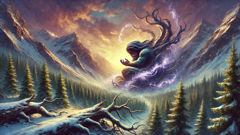
It is told that Svyatogor was not born in the usual way. The mountain winds carried his first cries, echoing from summit to summit, and the snowmelt itself seemed to shape his cradle. Ancient birches bowed when he passed, and the wolves of the deep forest kept silent in his presence. By the time he was but a youth, Svyatogor towered above the tallest men; his shoulders were as broad as riverbanks, his arms thick as ancient oaks. The earth trembled at his approach, not out of malice but in recognition—here was a being who belonged as much to stone and frost as to flesh and blood.
Yet Svyatogor’s early years were not filled with joy. Giants, though mighty, are often lonely, and he found little comfort among his kin. The smaller folk—peasants and wandering minstrels—fled at his sight, believing him to be a thunder god or a harbinger of doom. Only the animals, wise in their way, sensed the gentleness within his massive form. Foxes darted between his feet, hares nibbled at the edges of his cloak, and once, a wounded eagle let him cradle it to his chest until it was strong enough to soar again.
As seasons turned and forests thickened, word of Svyatogor’s strength spread far and wide. He became a figure of awe and dread in equal measure. Villagers left offerings at the mountain passes—bread, salt, and berries—in hopes of appeasing the giant. Children dared each other to touch the footprints he left in the mud, great hollows that soon filled with rainwater and became small lakes. His life was one of isolation, yet he watched over the land with a silent protectiveness, defending it from marauders and the shadowy spirits that haunted the night.
But even giants cannot escape the flow of fate. One summer, as Svyatogor wandered a high ridge, he encountered a hermit named Dobrynya, a wise man with a crooked staff and eyes like winter ice. Dobrynya spoke of balance—the need for the strong to shelter the weak, for mountains to yield rivers, and for every living creature to know its place within the great circle of the world. Svyatogor listened, his heart aching with a longing he could not name. In that moment, he understood that his strength was not a curse, but a gift meant to serve others.
He took up the mantle of bogatyr, champion of the people, though few dared approach him directly. In the years that followed, tales of Svyatogor’s deeds spread across the land: he felled trees with a single blow to rebuild burned villages; he blocked floods by shifting boulders into riverbeds; he crushed marauding bandits who threatened the harvest. Yet with each act of might, the burden on his soul grew heavier. He longed for companionship, for laughter shared around a fire, for a place where his size would not set him apart.
Still, Svyatogor pressed on. He roamed the wild places, guided by a sense of duty as deep as the roots of the mountains themselves. The forests became his refuge, the rivers his confidants. Every now and then, he glimpsed others like himself—strange travelers, wandering spirits, and, on one rare occasion, a giantess who vanished into the mist before he could call out. The loneliness was a constant ache, yet he never wavered in his role as guardian of the land.
The Burden of Strength: Svyatogor’s Wanderings
As years slipped by like water over river stones, Svyatogor’s legend only grew. He became a mythic presence, as much a part of the landscape as the forests he watched over. But with each passing season, the weight of his own power became more apparent—not just to those who heard his name whispered around campfires, but to Svyatogor himself.
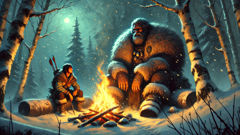
His strength, once a marvel, now felt like a chain. Wherever he walked, the earth groaned beneath his feet. He could no longer cross simple bridges without snapping timbers; village fields buckled if he tarried too long. The people revered him but kept their distance. No hut could shelter him, no bread oven could sate his hunger. He slept under the stars, cradling his head against cliffs, letting the wind sing him to sleep. Sometimes he longed to be small—just for a day—to slip unnoticed through a market or share mead in a crowded tavern.
One winter, as snow blanketed the valleys and wolves howled at the moon, Svyatogor found himself near a frozen lake at the edge of a dense birch forest. There, he met a wandering knight named Ilya Muromets, a bogatyr famed for his own courage and virtue. Unlike others, Ilya did not fear Svyatogor. He looked up—far up—and greeted the giant as a brother-in-arms. The two shared stories by firelight, their laughter echoing across the frozen water. For the first time in years, Svyatogor felt a kinship that warmed him more than any cloak.
Ilya spoke of battles and feasts, of the joys and sorrows that defined mortal men. Svyatogor listened, fascinated by tales of camaraderie and the bonds forged in struggle. In return, Svyatogor taught Ilya about the ancient spirits of the forest, about listening to the language of trees and rivers. For a brief while, they traveled together—two heroes, one of earth and one of men, united in purpose.
But even this friendship could not last. Svyatogor’s size made journeying together difficult; paths that suited Ilya were impassable for the giant. When they reached a narrow mountain pass, Svyatogor was forced to stop. He watched as Ilya disappeared into the distance, his heart heavy with envy and pride. That night, Svyatogor lay beneath a sky ablaze with stars, pondering the limits of his strength. Could he ever belong? Or was he doomed to wander alone, forever set apart by the very gift that made him legendary?
He wandered further north, seeking solace in the wildest regions he could find. The spirits there were older, stranger—creatures of ice and shadow who whispered riddles on the wind. Svyatogor conversed with them, hoping for wisdom or at least distraction. Yet their answers were cryptic, reminding him that all things have their place. Giants were not meant for villages, nor could mountains roam with rivers.
Svyatogor began to sense the world resisting him. Each step seemed heavier than the last; his mighty arms tired quickly, and even his voice lost some of its thunder. The earth itself, once welcoming, now groaned louder in protest. He realized that his time was not infinite—that even giants must yield to forces greater than themselves.
Fateful Meeting: The Secret of the Iron Chest
As the world shifted toward spring, Svyatogor’s travels took him into shadowed valleys and forgotten groves where legends said the veil between worlds was thin. He moved with care, listening to every sigh of wind, every call of bird or beast. The earth seemed to grow weary beneath him, and even the stones recoiled from his footsteps. It was during this time that fate drew him once more toward a meeting with Ilya Muromets—this time in the heart of an ancient forest rumored to be watched by unseen eyes.
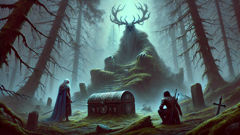
Svyatogor found Ilya resting beneath a twisted oak whose branches clawed at the sky. The knight greeted him warmly, and though Svyatogor’s heart was heavy, he forced a smile. They walked together, talking of old battles and dreams yet unfulfilled, until they came upon a peculiar sight—a small iron chest half-buried in moss at the base of a crumbling cairn. The chest was bound with strange runes, its surface cold to the touch even in sunlight.
Curiosity overcame them. Svyatogor tried to lift the chest, but even with all his strength, it would not budge. Ilya tried as well, but it was useless; the chest was immovable, as if rooted to the earth itself. Frustration flickered in Svyatogor’s eyes—how could something so small defy his might? Yet the chest seemed to mock him, its mystery deepening with each failed attempt.
A voice rang out from the shadows—a spirit of the forest, neither man nor beast, swathed in mist and crowned with antlers. The spirit spoke: "This chest holds the weight of the earth, and none may lift it who carries pride or seeks power for its own sake. To move it is to bear the greatest burden, one which no mortal—or giant—can hold for long."
Svyatogor, humbled by the spirit’s words, knelt beside the chest. He realized that his strength had always come at a cost—not just to himself, but to the world around him. The earth could not bear his weight forever, and neither could his heart. Ilya placed a hand on his shoulder, offering comfort.
The spirit, seeing Svyatogor’s humility, relented. "If you wish to carry the chest," it said, "you must accept not just its weight, but all the sorrow and longing that comes with it. Only then will you know your true place in the world."
With Ilya’s help, Svyatogor managed to lift the chest. At first, it felt light—almost buoyant. But with every step, it grew heavier until even Svyatogor’s colossal frame began to buckle. The earth trembled, and a great rumbling echoed through the forest. Svyatogor’s knees gave way; he collapsed to the ground, unable to rise. The weight of the chest pinned him like a mountain atop his chest.
In those final moments, Svyatogor understood the lesson hidden within the iron chest. True strength was not measured by feats of might but by humility, compassion, and the willingness to bear burdens for others. He looked to Ilya, who wept openly for his fallen friend. The spirit spoke once more: "The land remembers all who walk upon it. Though Svyatogor’s body may rest here, his spirit will live on—in every mountain, in every echo of thunder, in every tale told around the hearth."
Svyatogor closed his eyes, feeling the cool earth cradle him one last time. The weight lifted—not from his chest, but from his heart. Peace settled over him, and in that moment, the boundaries between man and myth dissolved. The giant became one with the land he had guarded so fiercely, leaving behind a legacy that would echo through the ages.
Conclusion
The story of Svyatogor lingers wherever mountains rise against the Russian sky and birch forests murmur in the wind. Though his strength once shook the earth and his loneliness seemed unending, his final act left an indelible mark on the world he loved. Villagers still speak of the giant whose footsteps carved lakes and whose laughter shook the pines, but they also remember the lesson his life imparted: that power without humility becomes a burden too heavy to bear. In every storm that sweeps across the steppes, in every echo off distant crags, Svyatogor’s spirit endures—not as a tyrant of might, but as a guardian who gave all for the land that bore him. His legend reminds us that even giants must kneel before the wisdom of nature, and that true greatness lies not in standing above others, but in knowing when to bow to forces beyond oneself.

